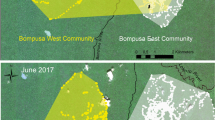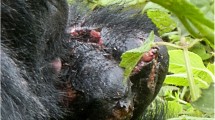Summary
A procedure originally developed for the study of post-conflict behaviour in captive groups was used to study a group of long-tailed macaques (Macaca fascicularis) in the wild. During 5 months, 156 post-conflict observations on victims of agonistic conflicts were collected and compared with matched-control observations. The findings reported previously for a captive group of the same species were confirmed. After a conflict victims scratched themselves more often and received more attacks than in control periods. Reconciliation and redirection were found to be characteristic of post-conflict situations. Their occurrence seemed to follow similar patterns in captivity and in the wild. The frequency of reconciliation, but not that of redirection, seemed to be lower after conflicts over food than in other situations. No evidence for consolation was found. In the wild, victims have the option of leaving the (sub)group in order to avoid the former aggressor. No evidence for this behaviour was actually found, but within the (sub)group victims tended to keep the former aggressor at a distance. Victims also seemed to suffer ecological costs in that they spent less time foraging than in control periods.
Similar content being viewed by others
References
Altmann J (1974) Observational study of behavior: sampling methods. Behaviour 49:227–266
Aureli F, Schaik CP van (1991a) Post-conflict behaviour in longtailed macaques (Macaca fascicularis): I The social events. Ethology 89:89–100
Aureli F, Schaik CP van (1991b) Post-conflict behaviour in longtailed macaques (Macaca fascicularis): II Coping with the uncertainty. Ethology 89:101–114
Aureli F, Schaik CP van, Hooff JARAM van (1989) Functional aspects of reconciliation among captive long-tailed macaques (Macaca fascicularis). Am J Primatol 19:39–51
Aureli F, Cozzolino R, Cordischi C, Scucchi S (1992) Kin-oriented redirection among Japanese macaques: an expression of a revenge system? Anim Behav (in press)
Cheney DL, Seyfarth RM (1989) Redirected aggression and reconciliation among vervet monkeys, Cercopithecus aethiops. Behaviour 110:258–275
Cheney DL, Seyfarth RM (1990) How monkeys see the world. University of Chicago Press, Chicago
Cords M (1988) Resolution of aggressive conflicts by immature long-tailed macaques Macaca fascicularis. Anim Behav 36:1124–1135
Cords M (1992) Post-conflict reunions and reconciliation in longtailed macaques. Anim Behav 44:57–61
Cords M, Aureli F (1993) Patterns of reconciliation among juvenile long-tailed macaques. In: Pereira ME, Fairbanks LA (eds) Juvenile primates: life history, development, and behavior. Oxford University Press, New York (in press)
Dunbar RIM (1988) Primate social systems. Comstok, Cornell University Press, Ithaca, NY
Hinde RA (1983) Primate social relationships. Cambridge University Press, Cambridge
Judge PJ (1982) Redirection of aggression based on kinship in a captive group of pigtail macaques. Int J Primatol 3:301
Judge PJ (1983) Reconciliation based on kinship in a captive group of pigtail macaques. Am J Primatol 4:346
Judge PJ (1991) Dyadic and triadic reconciliation in pigtail macaques (Macaca nemestrina). Am J Primatol 23:225–237
Kummer H, Kurt F (1967) A comparison of social behaviour in captive and wild Hamadryads baboons. In: Vagtborg BH (ed) The baboon in medical research. Texas University Press, Austin, pp 65–80
Maestripieri D, Schino G, Aureli F, Troisi A (1992) A modest proposal: displacement activities as indicators of emotions in primates. Anim Behav (in press)
Noordwijk MA van, Schaik CP van (1987) Competition among female long-tailed macaques (Macaca fascicularis). Anim Behav 35:577–589
Ren RM, Yan KH, Su YY, Qi HJ, Liang B, Bao WY, Wall FBM de (1991) The reconciliation behavior of golden monkeys (Rhinopithecus roxellanae roxellanae) in small breeding groups. Primates 32:321–327
Rijksen HD (1978) A field study on Sumatran orang utans (Pongo pygmaeus abelli Lesson 1827): ecology, behaviour and conservation. Veenman, Wageningen
Schaik CP van, Mirmanto E (1985) Spatial variation in the structure and litterfall of a Sumatran rain forest. Biotropica 17:196–205
Schaik CP van, Noordwijk MA van (1986) The hidden costs of sociality: intra-group variation in feeding strategies in Sumatran long-tailed macaques (Macaca fascicularis). Behaviour 99:296–315
Schaik CP van, Noordwijk MA van, Boer RJ de, Tonkelaar I den (1983) The effect of group size on time budgets and social behaviour in wild long-tailed macaques (Macaca fascicularis). Behav EcolSociobiol 13:173–181
Schino G, Scucchi S, Maestripieri D, Turillazzi PG (1988) Allo-grooming as a tension-reduction mechanism: a behavioral approach. Am J Primatol 16:43–50
Scucchi S, Cordischi C, Aureli F, Cozzolino R (1988) The use of redirection in a captive group of Japanese monkeys. Primates 29:229–236
Smuts BB, Cheney DL, Seyfarth RM, Wrangham RW, Struhsaker TT (1987) Primate societies. University of Chicago Press, Chicago
Sokal RR, Rohlf FJ (1981) Biometry. Freeman, New York
Waal FBM de (1984) Coping with social tension: sex differences in the effect of food provision to small rhesus monkey groups. Anim Behav 32:765–773
Waal FBM de (1987) Tension regulation and nonreproductive functions of sex among captive bonobos (Pan paniscus). Nat Geogr Res 3:318–335
Waal FBM de (1989a) Peacemaking among primates. Harward University Press, Cambridge, MA
Waal FBM de (1989b) Dominance ‘tyle’ and primate social organization. In: Standen V, Foley R (eds) Comparative socioecology, the behavioural ecology of humans and other animals. Blackwells, Oxford, pp 243–263
Waal FBM de, Ren RM (1988) Comparison of the reconciliation behavior of stumptail and rhesus macaques. Ethology 78:129–142
Waal FBM de, Roosmalen A van (1979) Reconciliation and consolation among chimpanzees. Behav Ecol Sociobiol 5:55–66
Waal FBM de, Yoshihara D (1983) Reconciliation and redirected affection in rhesus monkeys. Behaviour 85:224–241
York AD, Rowell TE (1988) Reconciliation following aggression in patas monkeys, Erythrocehus patas. Anim Behav 36:502–509
Author information
Authors and Affiliations
Rights and permissions
About this article
Cite this article
Aureli, F. Post-conflict behaviour among wild long-tailed macaques (Macaca fascicularis). Behav Ecol Sociobiol 31, 329–337 (1992). https://doi.org/10.1007/BF00177773
Received:
Accepted:
Issue Date:
DOI: https://doi.org/10.1007/BF00177773




